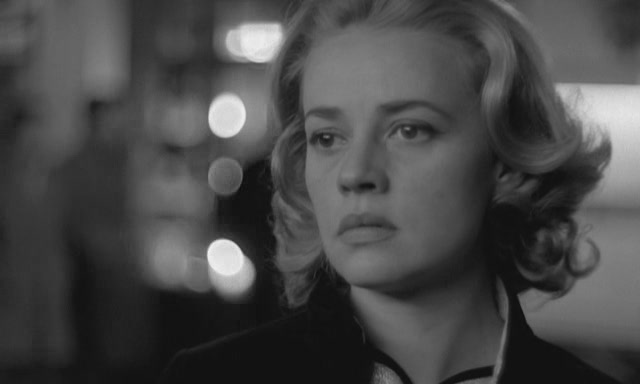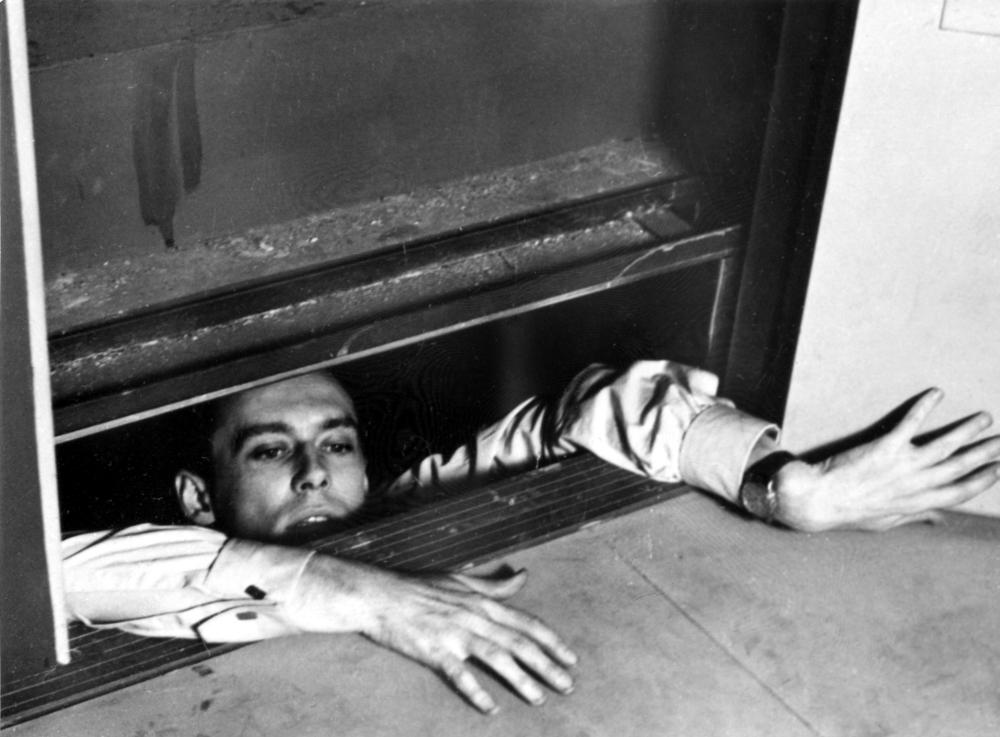
Elevator to the Gallows (1958) is such a groundbreaking film, you can argue that it’s the first of the neo-noir. It’s the debut of director Louis Malle, shot when he was only 24 years old. It’s difficult now to appreciate the originality of Elevator the Gallows; but in 1958, no one had seen a film with a Miles Davis soundtrack or one where the two romantic leads were never on-screen together.
A thriller that still stands up today, Elevator to the Gallows (Ascenseur pour l’échafaud) is about the perfect crime that goes awry. The French war hero Julien (Marcel Ronet), is now working as an executive for a military supplier. He’s having an affair with Florence (Jeanne Moreau), whose husband owns the firm. Seeking to possess both his lover and his company, Julien implements an elaborately detailed plan to get away with his boss’ murder. Everything goes perfectly until he makes one oversight; then the dominoes begin to fall, and soon he is trapped in a very vulnerable situation. He is incommunicado, and he remains ignorant of the related events that transpire outside.
Almost every character makes false assumptions about what is going on. Florence mistakenly believes that Julien has run off with a young trollop. A young punk and his peppy girlfriend incorrectly assume that they are on the verge of arrest. The police pin a murder on Julien that he didn’t commit – but his alibi is the murder that he DID commit. And there’s a great scene where Julien is striding confidently into a busy cafe, unaware that he has become the most recognizable fugitive in France.
It’s a page-turner of a plot, and the acting is superb, but Malle’s choices make this film. When Florence thinks that she’s been dumped, she walks through Paris after dark. Jeanne Moreau doesn’t have any lines (although her interior thoughts are spoken in voice-over). Instead, she embodies sadness and shock through her eyes and her carriage – the effect is heartbreaking. Mile Davis’ trumpet reinforces the sadness of her midnight stroll.
The Miles Davis score is brilliant, but Malle often makes effective use of near silence, too. And he reinforces the kids’ shallowness over-dramatizing with strings. Every audio choice is perfect.
There’s vivid verisimilitude in a Paris police station at 5 am – all grittiness with drunks sobering up, and the holding cage filled with thieves and prostitutes. The contrast in how the police treat the wealthy and influential is stark and realistic.
The young couple is completely believable. The joyride is absolutely what these characters would do. The young guy is sullen and the girl is hooked on his moodiness. And, of course, with the self-absorption of youth, they over-dramatize their own situation.
Every scene in Elevator to the Gallows is strong, but the scenes with Moreau pop off the screen. This was her star-making role, and perhaps the definitive Jeanne Moreau role (yes – even more than Jules et Jim).
Marcel Ronet is also excellent as Julien. Julien is a guy with serious skills, and the confidence and poise to use them. When Julien is trapped in the situation that would cause most of us to freak out, he immediately starts working on an Apollo 13-like solution without any hint of panic. The harrowing scenes of Julien’s entrapment and escape fit alongside the mot suspenseful moments in the great French crime thrillers Rififi (1955) and Le trou (1960). The means of his eventual escape is one of the most ironic moments in cinema.

Eventually we see the marvelous Lino Ventura as the detective captain. A former European wrestling champion, Ventura had debuted five years earlier in the great Touchez pas au grisbi and had followed that with several gangster/cop supporting roles. Immediately after Elevator to the Gallows, Ventura started getting lead roles. Ventura had an almost unique combination of charm, wit and hulking physicality; he’s one of the few actors I can envision playing Tony Soprano.
The high contrast black and white photography, the voiceovers and the city at night all scream “noir”. So does the amorality of the main characters seeking to get what they want by murder, the ironies of the miscommunications and mistaken assumptions and the profoundly cynical ending.
But the look and sound of Elevator to the Gallows is entirely new. Th experience of viewing Elevator to the Gallows seems closer to the American indie triumphs of the early 1970s (The Godfather, Chinatown, The Conversation) than to the likes of The Postman Always Rings Twice or The Big Sleep. Elevator to the Gallows remains a starkly modern film that is still as fresh today as in 1958.
Elevator to the Gallows plays occasionally on Turner Classic Movies and is available on TCM Watch; it’s also available streaming on Hulu and on DVD from Netflix.

